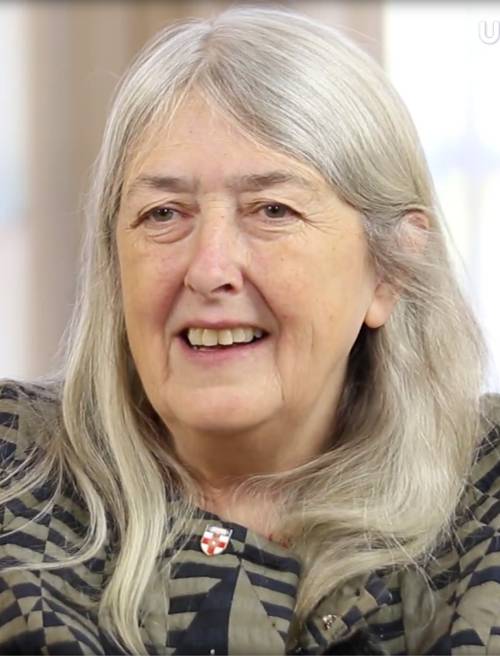
FAQ About Mary Beard

Who is Mary Beard?
Mary Beard is a renowned British classicist, historian, and author, celebrated for her expertise in Roman culture and history. She is a Professor of Classics at the University of Cambridge and a Fellow of Newnham College. Her work bridges the gap between academic research and public discourse, making ancient history accessible to a broader audience.

What is Mary Beard known for?
Mary Beard is known for her extensive work on ancient Roman history and culture. She is a well-respected author and television presenter, having written and presented numerous documentaries aimed at making classical history understandable and interesting to the public. Her books, such as "SPQR: A History of Ancient Rome," have received critical acclaim for their thorough research and engaging style.

What are some of Mary Beard's most popular books?
Some of Mary Beard's most popular books include "SPQR: A History of Ancient Rome," "Women & Power: A Manifesto," and "Pompeii: The Life of a Roman Town." These works have been praised for their depth of research and the accessibility of their content to readers with varying levels of familiarity with classical studies.

Has Mary Beard received any awards for her work?
Yes, Mary Beard has received several awards and honors throughout her career. In 2013, she was appointed an Officer of the Order of the British Empire (OBE) for services to classical scholarship. She has also received fellowships from prestigious institutions and was awarded the Wolfson History Prize in 2008 for her book "Pompeii: The Life of a Roman Town."

How does Mary Beard contribute to public understanding of history?
Mary Beard contributes to public understanding of history through her books, television documentaries, and public lectures. Her approachable style and enthusiasm for ancient history help in demystifying complex historical topics, making them accessible and engaging for a broad audience. She uses a variety of media platforms to reach people outside the traditional academic circles.

What academic positions does Mary Beard hold?
Mary Beard holds the position of Professor of Classics at the University of Cambridge. She is also a Fellow of Newnham College, Cambridge, where she has an active role in academic and college life. Her work in these positions involves teaching, conducting research, and mentoring students in classical studies.

What television documentaries has Mary Beard presented?
Mary Beard has presented several television documentaries for the BBC, including "Meet the Romans with Mary Beard," "The Romans in Britain," and "Pompeii: Life and Death in a Roman Town." These programs aim to bring the history and culture of ancient Rome to life for a contemporary audience.

What is Mary Beard's approach to classical studies?
Mary Beard's approach to classical studies is characterized by a combination of rigorous academic research and an accessible, engaging style. She emphasizes the relevance of ancient history to modern times and is known for challenging traditional narratives by incorporating diverse perspectives and voices that have been overlooked in classical scholarship.

Is Mary Beard involved in any academic journals or publications?
Yes, Mary Beard is involved in academic publications. She has been an editor of "The Times Literary Supplement" and contributes articles and reviews to several academic journals and popular magazines. Her writing often focuses on bringing scholarly insights to broader audiences.

What themes does Mary Beard explore in her book "SPQR: A History of Ancient Rome"?
In "SPQR: A History of Ancient Rome," Mary Beard explores the political and social history of Rome, spanning from its legendary beginnings to the height of the empire. She examines how Rome grew from a small village to a vast empire and delves into the lives of its citizens, revealing the complexities of Roman society, politics, and daily life.

How has Mary Beard influenced modern perceptions of Roman history?
Mary Beard has significantly influenced modern perceptions of Roman history by making it accessible and relevant to today's audiences. Her works bring new insights into the lives of ordinary Romans as well as the political figures of the time, offering a comprehensive view that often challenges traditional narratives. Her lively writing style and media presence have popularized Roman history in contemporary culture.

What is the focus of Mary Beard's book "Women & Power: A Manifesto"?
"Women & Power: A Manifesto" by Mary Beard focuses on the themes of gender inequality and female empowerment, tracing the roots of these issues back to ancient cultures. Beard examines how historical narratives have often marginalized women and discusses ways to rethink these stories to better reflect the significant roles women have played throughout history.

Has Mary Beard ever faced controversy or criticism?
Yes, Mary Beard has faced controversy and criticism, particularly for her outspoken views on contemporary social and political issues, as well as her interpretations of classical history that challenge traditional narratives. Nevertheless, she is respected for her scholarship and ability to provoke discussion and debate on important topics.

How does Mary Beard's work appeal to a non-academic audience?
Mary Beard's work appeals to a non-academic audience due to her engaging writing style, lively presentation of historical facts, and ability to relate ancient history to current global and social issues. Her television documentaries and public talks further enhance her appeal by bringing history to life through visual storytelling and charismatic oratory.

What role does Mary Beard play in the academic community?
In the academic community, Mary Beard plays the role of an influential scholar and educator. She teaches, mentors, and conducts research at the University of Cambridge, contributing to classical scholarship through her publications and public engagement. She is also a role model for women in academia, highlighting the importance of diversity in historical research.

What is Mary Beard's perspective on the relevance of ancient history today?
Mary Beard believes that ancient history is highly relevant today, offering insights into the roots of modern society, politics, and culture. She highlights that understanding the past gives context to contemporary issues and can illuminate patterns and behaviors prevalent in today's world. Her work encourages readers to draw connections between ancient and modern times.

Why is Mary Beard considered an important figure in classical studies?
Mary Beard is considered an important figure in classical studies due to her extensive contributions to the field through her research, publications, and public outreach. Her ability to transform scholarly content into engaging narratives has made ancient history more accessible, inspiring both academic and non-academic audiences. Beard's willingness to challenge conventional narratives further solidifies her influence and importance.

How has Mary Beard contributed to discussions on gender in classical history?
Mary Beard has contributed to discussions on gender in classical history through her writings and talks that examine the roles and representations of women in ancient civilizations. Her work often highlights the marginalization of female voices in historical narratives and advocates for the inclusion of diverse perspectives to provide a fuller understanding of history.

What impact has Mary Beard had on modern media's portrayal of history?
Mary Beard has had a significant impact on modern media's portrayal of history by participating in documentaries and writing that bring academic research into the public eye. Her work emphasizes storytelling and relatability, making history both informative and entertaining. Beard's influence has encouraged media to present history with greater depth and accuracy while also appealing to broader audiences.
